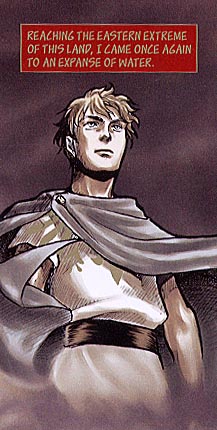 Written by Jai Sen
Written by Jai Sen
Art by Seijuro Mizu, Umeka Asayuki, and Shino Yotsumoto
304 pages, color
Published by Shoto Press
Last year, Jai Sen and Rizky Wasisto Edi’s Garlands of Moonlight was a genuine breakout hit, earning an Eisner nomination and great amounts of critical praise. Now, not only do Sen and Edi have a sequel hitting stores this summer, but Sen is also responsible for a brand new book, The Golden Vine… and history might just be about to repeat itself.
Approximately 2300 years ago, Alexander the Great was poised to conquer the world. An unstoppable force, his army of Greeks conquered everything in its path. And then, at the height of his power, the great love of his life died, and Alexander became reckless and led an ill-fated campaign into India that caused his own death. But in this other timeline, Alexander did conquer the world, thanks to several slightly different choices in life. Now his son, Prince Alexander IV, is summoned back home to take over the throne… but will his father’s empire come tumbling down with a new head of power?
 Alexander the Great is an intriguing historical figure—there are several very high-profile movies about him currently in production. It’s no small wonder; it’s fascinating how one man was able to do so much in such a short period of time. Sen’s story in The Golden Vine recognizes the most important aspects of Alexander the Great’s life—his ambitions, his strategies, his loves—and brings them to the forefront in this alternate take on his life. It’s easy to see how if things had gone slightly different that Alexander really could have conquered the world, as Sen’s story dips between the “present” of Prince Alexander IV’s return home, and flashbacks to Alexander the Great in the prime of his life. I was actually both surprised and impressed that a book relying so much on flashbacks was able to hold one’s interest so well; over half of the book’s pages take past as memories of King Hephaestion, of his life with Alexander the Great, or relating letters that Alexander had written. Sen wisely ties the different story threads and timelines together with not only a mystery, but also with the repeating of history, like Alexander the Great’s and Hephaestion’s relationship being mirrored in that of Alexander IV and Eumenos’s love for each other. It’s an ambitious book, but just like this Alexander’s attempt to conquer the world, it’s entirely victorious.
Alexander the Great is an intriguing historical figure—there are several very high-profile movies about him currently in production. It’s no small wonder; it’s fascinating how one man was able to do so much in such a short period of time. Sen’s story in The Golden Vine recognizes the most important aspects of Alexander the Great’s life—his ambitions, his strategies, his loves—and brings them to the forefront in this alternate take on his life. It’s easy to see how if things had gone slightly different that Alexander really could have conquered the world, as Sen’s story dips between the “present” of Prince Alexander IV’s return home, and flashbacks to Alexander the Great in the prime of his life. I was actually both surprised and impressed that a book relying so much on flashbacks was able to hold one’s interest so well; over half of the book’s pages take past as memories of King Hephaestion, of his life with Alexander the Great, or relating letters that Alexander had written. Sen wisely ties the different story threads and timelines together with not only a mystery, but also with the repeating of history, like Alexander the Great’s and Hephaestion’s relationship being mirrored in that of Alexander IV and Eumenos’s love for each other. It’s an ambitious book, but just like this Alexander’s attempt to conquer the world, it’s entirely victorious.
Seijuro Mizu, Umeka Asayuki, and Shino Yotsumoto’s art in The Golden Vine is impressive in not only how it looks on paper, but how three different artists were able to have look very alike and yet distinct from each other. Each handling a different section of the story—Mizu with Hephaestion’s memories, Asayuki with Alexander IV’s story, and Yotsumoto with Alexander the Great’s letters—it’s easy at a glance to see which of these Japanese artists have tackled any given page. Mizu and Yotsumoto each bring a level of texture to their art in the hair and faces in slightly different ways, while Asayuki’s is the smoothest, apt for the youngest of the narratives in the book. My only real quibble is that I found myself wondering about a lot of the page layouts of The Golden Vine; printed in landscape, it often reads as two vertical columns on the page instead of horizontally from one edge to another. Any experienced reader of comics shouldn’t have too much trouble, thanks to some strong visual cues from the art, but what could have been the sort of book for those not used to sequential art to read might end up being more than a little confusing. One thing the artists do extremely well, though, is work with a special gold metallic ink. It’s impressive in how they were able to keep such an element as a quiet part of the background from one page to the next, only to leap to the forefront and look spectacular just when it needs to. It’s a great way to use the gold ink, keeping it both ordinary and extraordinary at the same time.
The Golden Vine is a genuine joy to read; Shoto Press’s first color book is both a gripping story and a gorgeously presented piece of art. It’s great to see that Garlands of Moonlight wasn’t just a fluke; with each new book, Shoto Press is proving itself to be a publisher with a great design sense and an eye for detail. Solicited in the current Previews for shipping in July 2003, you absolutely must order yourself a copy. (It’s on page 357, and is Diamond code MAY03 2409.) Trust me, you don’t want to miss out on something this good. Well done.
